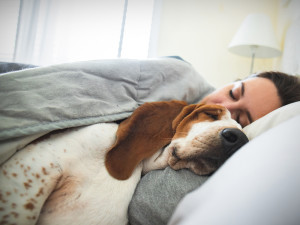It’s Time to Spring Forward Soon—And Yes, Daylight Saving Time Confuses Pets, Too
Animal behaviorist Karen London on how the time change will affect your cat or dog.

Share Article
Sunday, March 9 is daylight savings time. While that means we are awake for another hour of sunlight after a dark winter (yay!), it also means losing an hour of sleep — boo. Not everyone will change their clocks, though. While most of the country observes this ritual, in Arizona, only people who live on the Navajo Nation change their clocks, and those in Hawaii and Puerto Rico get to keep their sleep.
But if you are in that majority and also happen to be a pet parent, it’s a good idea to prepare yourself for this semi-annual annoyance. Daylight saving time is an outdated and unhealthy human construct, and many animals are having no part of it. Dogs and cats follow their circadian rhythms.

Save on the litter with color-changing tech that helps you better care for your cat.
What is circadian rhythm?
Pets are inclined to be active at certain times of the day just as birds are inclined to sing at sunrise and coyotes tend to howl during the night. The tendency to behave in certain ways over the course of the day is part of the daily cycle called a circadian rhythm.
These internal clocks override our rigid time schedules, so many dogs (and many more cats) will probably get up at their usual time, regardless of what the clock says, to start their day.
The light/dark cycle of our rotating planet is responsible for the circadian rhythms that lead to the predictable timing of behaviors throughout the day. Light leads to changes in the hypothalamus, which regulates these daily rhythms. The pattern of light affects sleep cycles, hormone levels, brain wave activity and body temperature, all of which have an impact on behavior.
Helping your pet adjust to the time change
When the time shifts, pets are generally confused, and we have no way to explain this to them. Here are a couple of ways you can help your dog or cat adapt:
Keep a routine.
It’s typical for pets to need a couple of days to adjust after the time change, but some take longer than others. Pets with a strong internal clock are heavily influenced by sunrise, sunset, and predictable feelings of hunger. As those cues still happen, pets who respond to them tend to struggle with the new schedule.
Some dogs are also highly schedule-oriented, but they respond to human cues — the alarm clock, people getting out of bed, the sound of food being put in the bowl — and they are often able to adapt more quickly to the wackiness of humans messing around with clocks.
Take it slow.
It can be helpful to meet pets in the middle as they adjust to the time change. It may be easier if you can break up the hour difference and only adjust their schedule — walks, feeding time, bedtime and waking up — by 15 to 30 minutes each day. If your schedule does not allow that kind of flexibility or you find that your dog gets in line with the new daily rhythm within a few days anyway, it may not be worth the extra effort. But, for the rare dog who struggles for a long time with the time change, breaking up the hour into smaller pieces for a more gradual adjustment can be a great kindness.
It can be tough for some pets (and let’s be real, for some people too) to adapt, so build in room for an adjustment period. Giving them a few extra minutes to take care of business might be all it takes to get them acclimated to the abrupt change in schedule.

Karen B. London, PhD, CAAB, CPDT-KA
Karen B. London, Ph.D., is a Certified Applied Animal Behaviorist and Certified Professional Dog Trainer who specializes in working with dogs with serious behavioral issues, including aggression, and has also trained other animals including cats, birds, snakes, and insects.
Related articles
![Woman laying on the grass smiling at her dog]()
10 Ways You Can Make Your Dog’s Life Better
Number 6 will probably surprise you.
![Dark brown dog sitting on a gray couch in a living room]()
Turns Out Dogs Can Tell, Er, Smell Time
There’s no time like the present, according to your pet.
![Dog with sleep startle reflex. Woman lays on her couch and gently wakes up her dog]()
Why Does My Dog Freak Out When I Wake Them Up?
“Let sleeping dogs lie” is more than just a confusing old saying.
![Woman and dog sleeping together in bed]()
Where Should Your Dog Sleep at Nighttime?
It’s a personal preference, but here are the pros and cons.
![a puppy sprawled out on the couch sleeping]()
Is Your Puppy Sleeping Enough?
Four signs your puppy is ready for a nap.





